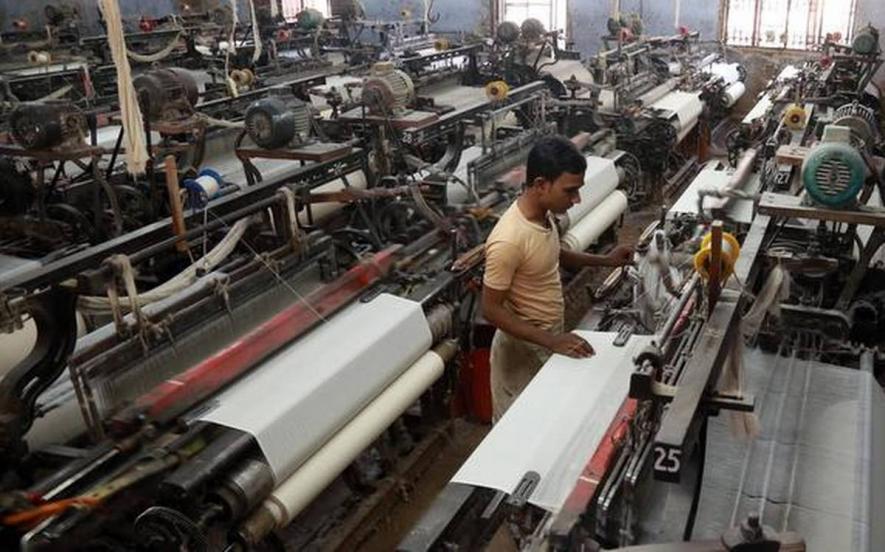‘Maharashtra's Manchester’ is Dying a Slow Death Due to Modi Government’s Policies

Representational Image. Image Courtesy: The hindu
Amar Dongare, the owner of a power loom in Ichalkaranji, Maharashtra, was popular in the city for his participation in social activities. On December 22, Amar died by suicide due to a severe financial crisis in his business. The news came as a shock to everyone who knew Amar. However, they were also aware that the industry was going through what has been its worst period.
Not just Amar, two more power loom owners from Ichalkaranji city have died by suicide since Diwali. Santosh Narmade ended his life on November 24. Mahesh Jawale, who used to own a unit for preparatory work also died by suicide. Their reason was the same. The power loom industry is dying due to multiple reasons, including policies of the Union Government.
Ichalkaranji city was home to more than one lakh 25 thousand power looms three years ago. About 80,000 were traditional whereas between 30,000 to 40,000 were semi-modern and modern. In the first week of 2021, only about 80,000 of the 1.25 lakh looms are working. More than 40 thousand looms closed down in the last three years.
Almost 40,000 labourers were engaged in working with looms and more than 40,000 were working with affiliate industries. There are twenty thousand power loom owners; more than one lakh families are dependent on the industry in this town of 3.5 lakh people.
The problems of Ichalkaranji's loom industry are not city-centric; it is primarily due to the policies of the Centre. NewsClick spoke to a number of loom owners over the phone. Some of them have requested anonymity while others agreed to speak on the record.
Satish Koshti is the president of the Ichalkaranji Powerloom Weavers Cooperative Association Limited and also owns several looms. “The first jolt to our industry was demonetisation; it disrupted the business. However, we survived that somehow. The implementation of GST from July 1, 2017 was another severe jolt to us,” he said.
Before GST came into place there was no tax on prepared cloth. However, the Modi government taxed readymade material at five percent, resulting in an increase in the price of the product. During the days when there was a consultation on GST, the officers concerned had come to the offices of the looms’ association. “They assured us that GST would stream-line money flow and bring transparency in the business, so we supported the GST. But in the end, it harmed us more than it benefited us,” said Koshti.
Another power loom owner told NewsClick that GST returns pose another problem. “We started investing time in filing GST. The delay in the returning of money was another important issue which stopped the cash flow in the market. Ultimately payments got delayed and the business crumbled,” said this owner.
Not just the association in Ichalkaranji, but those from other textile producing cities like Malegaon, Bhiwandi, Dhule and Solapur sent delegations to the Centre demanding a rectification. However, their demands were not accepted.
While production on our shores crumbling due to these issues, an outsider found the opportunity to enter the scene. According to Koshti, cloth from China, which was not seen much until then, now made its presence in India, be it in garments or plain cloth.
“Bangladesh is among the most favoured nations in India. China started dumping their produce in Bangladesh and that cotton started coming to India. We requested the commerce secretary to stop this but it hasn’t happened yet. This is another reason why the demand for Indian cotton is going down in the market,” said Koshti.
The association also wrote to Prime Minister Narendra Modi regarding the same, “but nothing has changed. Atmanirbhar Bharat is a relatively new announcement; we have been demanding this for two years now. We hoped that we would be benefited from the new package but nothing has been announced till now,” said Koshti.
An already beleaguered industry was hurt further when the novel coronavirus put a complete stop to production and the market, adding to the pressure on owners.
“The rates of raw material have increased by up to 30%. We used to get raw material for cotton at Rs 200 per kilo but that has been hiked to Rs 300. It has totally collapsed our business equations,” said another loom owner.
More than thirty thousand looms have closed down in the last two years, with owners literally selling their machines to scrap deals. Asif Kurane, a senior journalist from Kolhapur said the situation was “worrisome. Once Ichalkaranji was famed for its produce but you now hear stories of someone or the other shutting down their unit ever week. If the situation persists then thousands of labourers will be without work. We will only get to read in books that this city was once called Maharashtra's Manchester,” said Asif.
Get the latest reports & analysis with people's perspective on Protests, movements & deep analytical videos, discussions of the current affairs in your Telegram app. Subscribe to NewsClick's Telegram channel & get Real-Time updates on stories, as they get published on our website.
























